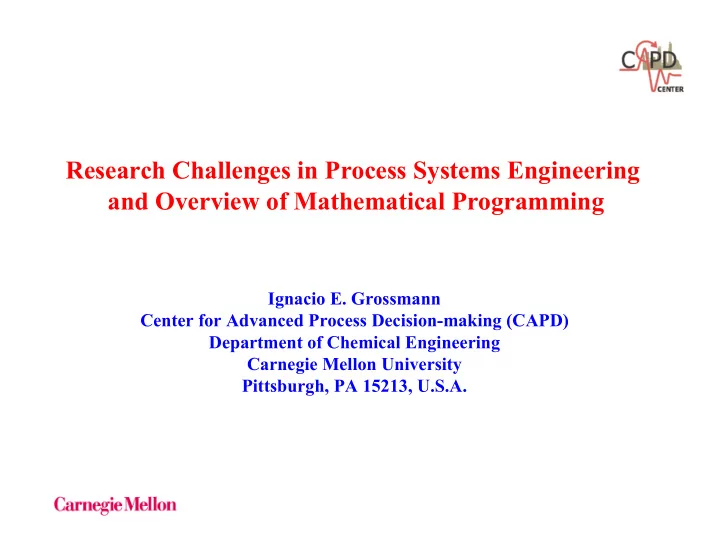

Research Challenges in Process Systems Engineering and Overview of Mathematical Programming Ignacio E. Grossmann Center for Advanced Process Decision-making (CAPD) Department of Chemical Engineering Carnegie Mellon University Pittsburgh, PA 15213, U.S.A.
Process Systems Engineering (PSE) Questions: 1. What is the role of Process Systems Engineering in “commodity” industry vs. “new emerging” technologies? Value preservation vs. Value creation 2. What is the future scope for fundamental contributions in Process Systems Engineering ? Science vs. Engineering 3. What are Research Challenges in Process Systems Engineering?
Changes in the Chemical Industry From Marcinowski (2006)
Economics of Chemical Enterprise Value preservation vs. Value Creation Revenues of major U.S. companies (billions) (2001) (2003) (2005) ExxonMobil $208.7 $237 $359 ChevronTexaco 99.7 120 193 Dow 27.8 32.6 46.3 DuPont 26.8 30.2 25.3 Procter & Gamble 39.2 43.4 56.7 Johnson & Johnson 32.3 41.8 50.5 Merck 21.2 22.4 22.0 Bristol-Myers Squibb 21.7 18.6 19.2 Amgen 4.0 8.4 12.4 Genentech 1.7 3.3 5.5
Move from Engineering to Science
Distribution Research Papers AIChE Journal 2005 Papers U.S. Fluid Mechanics, Transport Phenomena 57 18 Reactors, Kinetics, Catalysis 56 21 Process Systems Engineering 51 22 Separations 37 11 Particle Technology, Fluidization 28 11 Thermodynamics 19 2 Materials, Interfaces, Electrochemical Phenomena 21 9 Environmental, Energy Engineering 16 8 Bioeng., Food, Natural Products 9 5 Total 294 107 => Only 36% papers involve US-based authors Only 15% from top 25 U.S. schools
Observations Trade-offs: Value preservation vs. Value growth Chemicals/Fuels vs. Pharmaceutical/Biotechnology Research trend away from Chemical Engineering Science vs Engineering Major real world challenges Globalization, energy, environment, health => Need expand scope of Process Systems Engineering
Expanding the Scope of Process Systems Engineering (Grossmann & Westerberg, 2000; Marquardt et al, 1998)
Major Research Challenges I. Product and Process Design II. Energy and Sustainability III. Enterprise-wide Optimization
What is science base for PSE? Numerical analysis => Simulation Mathematical Programming => Optimization Systems and Control Theory => Process Control Computer Science => Advanced Info./ Computing Management Science => Operations/Business Math Programming & Control Theory “competitive” advantage
Motivation Math Programming Motivation Design, operations and control problems involve decision-making over a large number of alternatives for selecting “best” solution - Configurations (discrete variables) - Parameter values (continuous variables) Challenges: How to model optimization problems? How to solve large-scale models? How to avoid local solutions? How to handle uncertainties?
Mathematical Programming Rand Symposium, Santa Monica (1959) Given a space of alternatives that are specified through constraints in a mathematical model select decision variables to optimize an objective function = min ( , ) Z f x y = . . ( , ) 0 s t h x y ≤ ( ) , 0 g x y ∈ ∈ n m , { 0 , 1 } x R y MINLP: Mixed-integer Nonlinear Programming Problem Major challenges: - Combinatorics: scalability (NP-hard) - Nonconvexities: global optima
Classical Optimization Newton (1664) = min ( ) Z f x ∈ n x R = min ( ) Z f x = ( ) . . 0 s t h x Lagrange (1778) ∈ n x R Solution of inequalities Fourier (1826) Solution of linear equations Gauss (1826) Solution of inequality systems Farkas (1902)
Modern Optimization Linear Programming Kantorovich (1939), Dantzig (1947) x 2 x 1 x 2 Nonlinear Programming Karush (1939), Kuhn, A.W.Tucker (1951) x 1 y 2 Integer Programming R. E. Gomory (1958) y 1
Evolution of Mathematical Programming Egon Balas: Preface to Minoux (1983) 1950's Linear Programming Nonlinear Programming 1960's Network Theory Integer Programming Dynamic Programming 1970's Nondifferentiable Optimization Combinatorial Optimization: Graph Theory Theory Computational Complexity 1980’s Interior Point Methods Karmarkar (1984) 1990’s Convexification of Mixed-Integer Linear Programs Lovacz & Schrijver (1989), Sherali & Adams (1990), Balas, Ceria, Cornuejols (1993) 2000’s MINLP Global Optimization Logic-based optimization Search techniques (tabu, genetic algorithms) Hybrid-systems Computational progress: much faster algorithms/much faster computers
Progress in Linear Programming Increase in computational speed from 1987 to 2002 Bixby-ILOG (2002) For 50,000 constraint LP model Algorithms Primal simplex in 1987 (XMP) versus (CPLEX 7.1) 2400x Best(primal,dual,barrier) 2002 Machines Sun 3/150 800x Pentium 4, 1.7GHz Net increase: Algorithm * Machine ~ 1 900 000x Two million-fold increase in speed!!
Recommend
More recommend